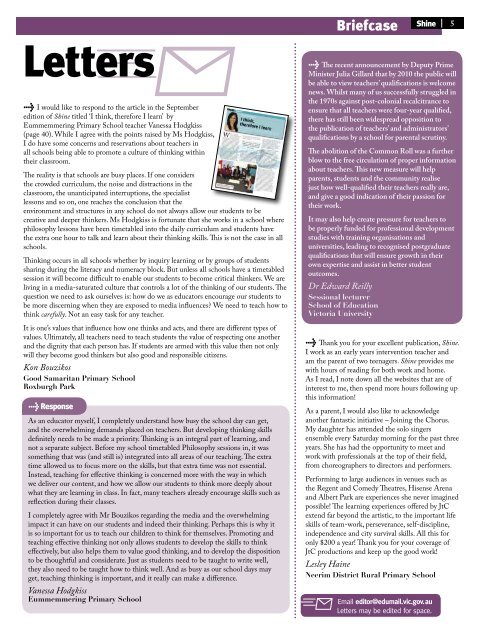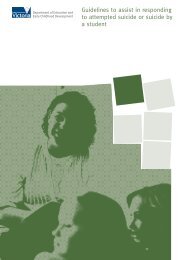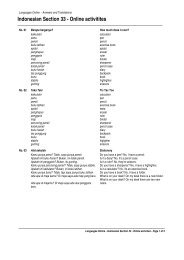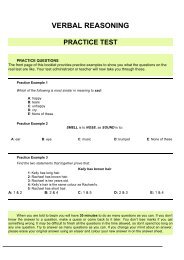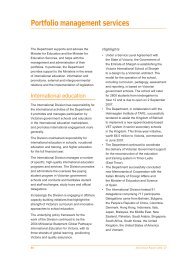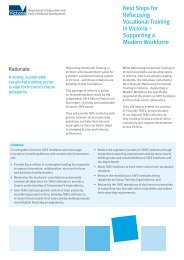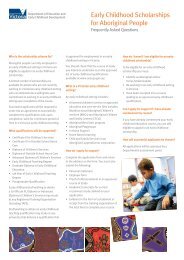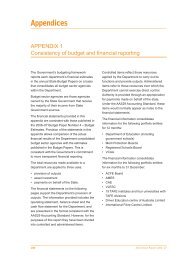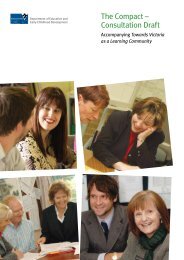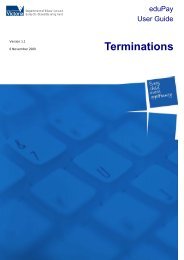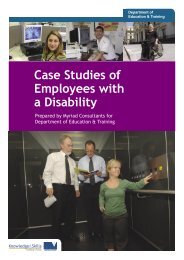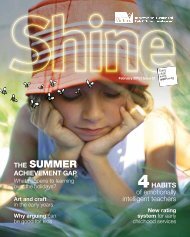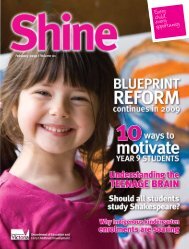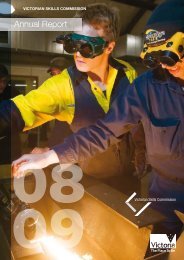November 2009 Vol. 1, Issue 10 (PDF - 16.2Mb) - Department of ...
November 2009 Vol. 1, Issue 10 (PDF - 16.2Mb) - Department of ...
November 2009 Vol. 1, Issue 10 (PDF - 16.2Mb) - Department of ...
You also want an ePaper? Increase the reach of your titles
YUMPU automatically turns print PDFs into web optimized ePapers that Google loves.
Xxxx<br />
Shine 5<br />
Briefcase<br />
Letters<br />
> I would like to respond to the article in the September<br />
edition <strong>of</strong> Shine titled ‘I think, therefore I learn’ by<br />
Eummemmering Primary School teacher Vanessa Hodgkiss<br />
(page 40). While I agree with the points raised by Ms Hodgkiss,<br />
I do have some concerns and reservations about teachers in<br />
all schools being able to promote a culture <strong>of</strong> thinking within<br />
their classroom.<br />
The reality is that schools are busy places. If one considers<br />
the crowded curriculum, the noise and distractions in the<br />
classroom, the unanticipated interruptions, the specialist<br />
lessons and so on, one reaches the conclusion that the<br />
environment and structures in any school do not always allow our students to be<br />
creative and deeper thinkers. Ms Hodgkiss is fortunate that she works in a school where<br />
philosophy lessons have been timetabled into the daily curriculum and students have<br />
the extra one hour to talk and learn about their thinking skills. This is not the case in all<br />
schools.<br />
Thinking occurs in all schools whether by inquiry learning or by groups <strong>of</strong> students<br />
sharing during the literacy and numeracy block. But unless all schools have a timetabled<br />
session it will become difficult to enable our students to become critical thinkers. We are<br />
living in a media-saturated culture that controls a lot <strong>of</strong> the thinking <strong>of</strong> our students. The<br />
question we need to ask ourselves is: how do we as educators encourage our students to<br />
be more discerning when they are exposed to media influences? We need to teach how to<br />
think carefully. Not an easy task for any teacher.<br />
It is one’s values that influence how one thinks and acts, and there are different types <strong>of</strong><br />
values. Ultimately, all teachers need to teach students the value <strong>of</strong> respecting one another<br />
and the dignity that each person has. If students are armed with this value then not only<br />
will they become good thinkers but also good and responsible citizens.<br />
Kon Bouzikos<br />
Good Samaritan Primary School<br />
Roxburgh Park<br />
> Response<br />
As an educator myself, I completely understand how busy the school day can get,<br />
and the overwhelming demands placed on teachers. But developing thinking skills<br />
definitely needs to be made a priority. Thinking is an integral part <strong>of</strong> learning, and<br />
not a separate subject. Before my school timetabled Philosophy sessions in, it was<br />
something that was (and still is) integrated into all areas <strong>of</strong> our teaching. The extra<br />
time allowed us to focus more on the skills, but that extra time was not essential.<br />
Instead, teaching for effective thinking is concerned more with the way in which<br />
we deliver our content, and how we allow our students to think more deeply about<br />
what they are learning in class. In fact, many teachers already encourage skills such as<br />
reflection during their classes.<br />
I completely agree with Mr Bouzikos regarding the media and the overwhelming<br />
impact it can have on our students and indeed their thinking. Perhaps this is why it<br />
is so important for us to teach our children to think for themselves. Promoting and<br />
teaching effective thinking not only allows students to develop the skills to think<br />
effectively, but also helps them to value good thinking, and to develop the disposition<br />
to be thoughtful and considerate. Just as students need to be taught to write well,<br />
they also need to be taught how to think well. And as busy as our school days may<br />
get, teaching thinking is important, and it really can make a difference.<br />
Vanessa Hodgkiss<br />
Eummemmering Primary School<br />
> The recent announcement by Deputy Prime<br />
Minister Julia Gillard that by 20<strong>10</strong> the public will<br />
be able to view teachers’ qualifications is welcome<br />
news. Whilst many <strong>of</strong> us successfully struggled in<br />
the 1970s against post-colonial recalcitrance to<br />
ensure that all teachers were four-year qualified,<br />
there has still been widespread opposition to<br />
the publication <strong>of</strong> teachers’ and administrators’<br />
qualifications by a school for parental scrutiny.<br />
The abolition <strong>of</strong> the Common Roll was a further<br />
blow to the free circulation <strong>of</strong> proper information<br />
about teachers. This new measure will help<br />
parents, students and the community realise<br />
just how well-qualified their teachers really are,<br />
and give a good indication <strong>of</strong> their passion for<br />
their work.<br />
It may also help create pressure for teachers to<br />
be properly funded for pr<strong>of</strong>essional development<br />
studies with training organisations and<br />
universities, leading to recognised postgraduate<br />
qualifications that will ensure growth in their<br />
own expertise and assist in better student<br />
outcomes.<br />
Dr Edward Reilly<br />
Sessional lecturer<br />
School <strong>of</strong> Education<br />
Victoria University<br />
> Thank you for your excellent publication, Shine.<br />
I work as an early years intervention teacher and<br />
am the parent <strong>of</strong> two teenagers. Shine provides me<br />
with hours <strong>of</strong> reading for both work and home.<br />
As I read, I note down all the websites that are <strong>of</strong><br />
interest to me, then spend more hours following up<br />
this information!<br />
As a parent, I would also like to acknowledge<br />
another fantastic initiative – Joining the Chorus.<br />
My daughter has attended the solo singers<br />
ensemble every Saturday morning for the past three<br />
years. She has had the opportunity to meet and<br />
work with pr<strong>of</strong>essionals at the top <strong>of</strong> their field,<br />
from choreographers to directors and performers.<br />
Performing to large audiences in venues such as<br />
the Regent and Comedy Theatres, Hisense Arena<br />
and Albert Park are experiences she never imagined<br />
possible! The learning experiences <strong>of</strong>fered by JtC<br />
extend far beyond the artistic, to the important life<br />
skills <strong>of</strong> team-work, perseverance, self-discipline,<br />
independence and city survival skills. All this for<br />
only $200 a year! Thank you for your coverage <strong>of</strong><br />
JtC productions and keep up the good work!<br />
Lesley Haine<br />
Neerim District Rural Primary School<br />
Email editor@edumail.vic.gov. au<br />
Letters may be edited for space.


